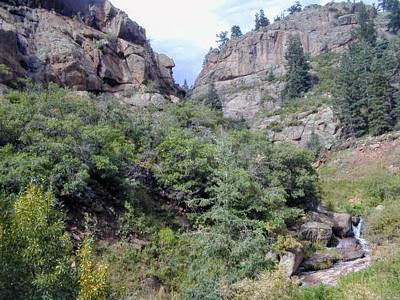
Life after death
Ecclesiastes 3: Who knows if there’s anything else to life?
One of the concerns of Solomon as he seeks meaning is what happens when life is finished. As far as he can tell animals and humans are pretty much alike; made of flesh, breathing the same air, and, upon death returning to the dust. It may be, he theorizes, that the human spirit survives death, but he really doesn’t have any proof of that. His conclusion is that since there’s uncertainty on this topic that a person ought to live life to the fullest right now because there may be no tomorrow. One thing we need to remember as we read Ecclesiastes is that we’re following Solomon on his quest for truth. He’s telling us his “in process” conclusions. To pick out a line here and there and state it as though this is Solomon’s final verdict is unfair to him. In the first part of the book he explains what he’s doing and we ought to remember that as we read his words. Another thing to remember is that he speaks from a purely Old Testament perspective. It isn’t until the first Easter and the understanding of life after death that develops from it that we have, as Paul Harvey would say, “the rest of the story.” In these words of Solomon we have the opinion of the secular humanist. When Jesus tells us that those who believe in him will never die we have the authority of the Son of God. The answer to Solomon’s “who knows” is this: “Jesus knows.” For someone who doesn’t have faith in Jesus to arrive at the same conclusion as Solomon is perfectly reasonable. As a believer in Jesus, though, I have the answer: “My Lord knows and he has told me that there is life after life.”
Take Away: The only real authority on the subject has told us that there is life after death, and that how we live now has a direct bearing on what that after-life will be like.
Tag: resurrection
Devotional on Isaiah
Two prophecies for the price of one
Isaiah 52: He didn’t even look human.
I think this is another of those “dual prophecies” in which the prophet speaks of something close at hand, but, maybe without realizing it, speaks words that resonate into the future. On one hand, he’s talking about the restoration of his people. They’re broken, almost to the point of extinction. If their condition is described as though they are one person, we would say that individual has been beaten to the point that he or she is unrecognizable. God’s salvation is coming but at this point things don’t look very good. It makes perfect sense to us that the writers of the New Testament are reminded of this passage as they see what happens to Jesus. The Jews are God’s people and Jesus is God’s Man. Its sin that nearly destroys the Jews and it’s the burden of our sins that takes Jesus to Calvary. Physically, God’s people are practically destroyed and the same can be said of Jesus. Yes, it’s easy enough for us to see the connection. However, we don’t have to walk away from this passage with a vision of “a ruined face, disfigured past recognition” on our minds. We do need to spend time gazing at that face, absorbing the full impact of what happens at the cross. Then, we can move on. Isaiah describes an amazing transformation saying, “Just watch my servant blossom!” That’s exactly what we see at the garden tomb that first Easter morning. Israel is to be restored by the grace of God. Jesus rises from the grave, victor over sin and death. Praise His Name!
Take Away: The story of salvation doesn’t end at the cross.
Devotional on Isaiah
Life after death – what a concept!
Isaiah 53: Life, life, and more life.
Isaiah prophetically sees the Suffering Servant, the man born to die for the sins of the world. He also sees, maybe not with total clarity, life after death for the Messiah. From our common point of view following death there’s deterioration. Even as Isaiah describes the terrible destruction of the Suffering Servant, he finds himself talking about abundant life. Our understanding of what happened at, and after, Calvary isn’t superior to Isaiah’s but we do have a clearer knowledge of those events. Jesus goes to the cross and there suffers and dies for the sins of the human race. His lifeless body is then placed in a tomb. Then, early on Sunday morning, the after-death process is abruptly halted. Rather than deterioration, life, new life, springs forth. Resurrection! That’s reason enough for Isaiah to conclude his mourning over the death of the Messiah with a surprising “life oriented” twist. However, there’s even more. As the suffering and death of Jesus is for us, so is his resurrection. We have hope of spiritual and physical life beyond this world because of what happens at that tomb. At one point Jesus says that he came that we might have abundant life. That promise is made sure the first Easter morning. Isaiah’s vision of “life, life, and more life” not only tells the story of the Suffering Servant, it’s our story too.
Take Away: As the suffering and death of Jesus is for us, so is his resurrection.
Devotional on Isaiah
Looking back and looking forward
Isaiah 64: Oh, that you would rip open the heavens and descend.
Isaiah longs for God to move and bring salvation to his people. He envisions the sky splitting apart as the Lord comes in dramatic, powerful fashion bringing hope to their hopelessness and healing to their brokenness. Hundreds of years later when that coming takes place its earthshaking indeed. The Gospels tell us of that powerful event, especially at the crucifixion and the resurrection of our Lord. However, this passage causes me to look forward as much as it causes me to look back to the first Easter. Even as Isaiah anticipates the coming salvation of the Lord, I anticipate his Second Coming. What an event it will be as Jesus splits the eastern sky and causes the mountains to tremble. “What a day that will be, when my Jesus I shall see.”
Take Away: Never doubt it – Jesus is coming back.
Devotional on Matthew

Mini-resurrection
Matthew 27: Many bodies of believers asleep in their graves were raised.
Like any normal person, I don’t enjoy reading about the crucifixion. I understand that it’s the finest display of God’s love possible and that my hope of salvation is right here in this event. Still knowing it is all real causes me to read quickly. I don’t want to linger here. Matthew states a detail that the other writers leave out. I haven’t thought much about this “resurrection” because, as I say, I’m generally hurrying on to Easter morning. However, Matthew says that as Jesus breathes his last that there’s an earthquake that opens some sealed tombs. Godly people buried there come forth, alive! Apparently, these are not the long dead, but, like Lazarus, are people laid to rest more recently. Residents of Jerusalem know them and respect them as people of God. Matthew tells us that this “mini-resurrection” can be confirmed by many who saw them. With that, the story hurries on to the burial of our Lord and then, hallelujah, to the empty tomb. We don’t know who these saints are, what they do and say, or what becomes of them. I know I’ve probably seen too much special effect filled TV but I can’t help but imagine a spiritual tsunami being triggered by Christ’s death on the cross. In my mind’s eye I see a shock wave emanating from the cross that’s so powerful that when it reaches graves of recent dead believers that they’re brought back to life. After all, the cross is all about death and life. A “spill over,” if you please, of the cross is this “back to life” event reported only by Matthew.
Take Away: Christ’s death on the cross was powerful in ways we can hardly grasp.
Devotional on Matthew

This angel got the job all the angels wanted
Matthew 28: He rolled back the stone and then sat on it.
This angel is pretty cool. He’s supernatural, coming down out of heaven. He’s majestic with shafts of light blazing out of him. He’s powerful, rolling away the stone. Then, what does he do? He has a seat on the stone he speaks calmly and reassuringly and matter-of-factly to the women. It’s almost as though they don’t know whether to bow down to him or invite him out for breakfast. Then the resurrected Jesus makes his appearance. It’s the same way. Here’s the victor over death, freshly raised from the grave; yet he greats them with a cheery “good morning” as though they are just old friends who happen to meet at the mall. The women, though, know just what to do in this case. They bow before him. Jesus, still in an apparent light hearted mood tells them not to be afraid, but to go and tell the disciples that “plan A” is still in order and they’re to meet him at the designated spot in Galilee. This first Easter morning is awesome — holy. It’s also happy, joyous, and just a little light hearted. It’s an interesting balance and the Church should do all it can to capture this wonderful mixture as it proclaims the resurrection of Jesus.
Take Away: It’s the resurrection that makes Christianity the happy, hope-filled religion that it is.
Devotional on Luke

Slowing down, looking around the garden
Luke 24: So thick-headed!
The blazing truth of the resurrection is so bright that it overwhelms everything else in this passage; and well it should. After all, it’s the center piece of the gospel message. Still, since I’ve been here many times before I can afford to shade my eyes and look around a bit. Somewhere around the third or fourth level of importance I see a bit of a theme here. Right after the resurrection Jesus reminds the women that he told them that all this would happen. “Then they remembered Jesus’ words.” Then, the women to go the disciples with the best news ever told, but “the apostles didn’t believe a word of it.” Peter, though, goes to the tomb. He “walked away puzzled, shaking his head.” Later, Jesus himself joins two disciples on the way to Emmaus. They’re so clueless about everything that he calls them “thick-headed” and “slow-hearted.” That night Jesus appears to all his disciples at once, but “they still couldn’t believe what they were seeing.” All of this takes place following the resurrection. These people, followers of Jesus, his friends, his disciples, his supporters, struggle to get their heads and hearts around what this is all about. So, I sit here more than 2000 years after the fact reading, once again, the story of the resurrection. I can draw from a rich tradition of theology, doctrine, and scholarship of the Bible. Still, I wonder: do I really get it? Have I gotten so used to the blazing light of the resurrection that I fail to embrace it? If so, I need to stop everything else and go back to the garden and spend some time there.
Take Away: For the resurrection to matter to me I have to take time to get my heart around it and fully embrace it.
Devotional on John

Its Jesus verses death
John 11: Lazarus, come out!
I’ve heard it said that Jesus specified that Lazarus “come out” of the grave because, had he just given the command to “come out” that there would have been a general resurrection. Personally, I think that’s more of a poetical take on this remarkable event than a realistic one. Still, I understand the statement of faith in that concept. This is an act of absolute authority over death. Jesus doesn’t even touch the dead body. He, in fact, never enters the tomb. From outside, after a public prayer, Jesus merely shouts out the command and Lazarus is resurrected. I can’t imagine any more powerful demonstration of authority over death than this one. Well, almost. Soon, an even more convincing event will take place. For now though, I’m happy to be reminded of this wonderful truth. Any time Jesus faces death, Jesus wins. Glory!
Take Away: One hope of all Christians is the hope of life after death.
Devotional on John

Holy Breath
John 20: He took a deep breath and breathed into them.
The story of the resurrection rightfully dominates the passage. If we don’t quite grasp some of the other things here it’s okay as long as we get that. Still, it’s worthwhile to slow down and, once we’ve freshly soaked in the power of the resurrection and look around a bit. Here we are, still in that first Easter and Jesus arrives inside a locked room where the disciples are gathered. On his agenda is this “breathing into them” event. He connects it to their receiving the Holy Spirit, using the word that we translate “breath” or “Spirit” to describe the event. In this they’re being invited breathe the breath of God. This is obviously related to the opening pages of our Bibles in which the Lord God makes human beings and then breathes into them the breath of life. Now, following the resurrection, Jesus symbolically breaths into his disciples the spiritual Breath of Life, the Holy Spirit. As we know, in the not too distant future, the disciples, likely in this same room, will be filled with “Holy Breath” as the Spirit dramatically comes upon them. One of the results of the resurrection is the potential of God’s people being filled with the new spiritual empowerment of “Holy Breath.”
Take Away: “Breathe on me, Breath of God.”
Devotional on Acts

The Unknown God
Acts 17: He makes the creatures; the creatures don’t make him.
Paul is speaking at the Areopagus in Athens. He’s disturbed by all the shrines to all the deities worshiped there. He’s even seen one shrine dedicated to the “unknown god.” The folks there don’t want to overlook some god and unintentionally get on the bad side of him! When Paul gets a chance to be heard, he uses that shrine as his launching point. He’s there to tell them about the God they’ve missed. His argument is right out of the Old Testament. The prophets of old often called their people to worship the God not made with human hands. Paul tells them that the God he serves is good and gracious, blessing their lives even though they haven’t acknowledged him. This God reaches out to them, inviting them to live in a relationship with him. However, there comes a time when the “unknown” becomes the “known.” It’s one thing to enjoy the blessings of God in ignorance. It’s something altogether different to know of this good God and to intentionally ignore him. In fact, God intends to divide people along that very line. He’s so serious about it that he’s already appointed a Judge over the people of the earth. To make it perfectly clear to the whole world that this is his chosen Judge, God has raised him from the dead. Many of Paul’s listeners, worshipers of a variety of gods, can’t swallow this “resurrection business.” They can’t imagine their gods having that kind of power. They walk away believing that they’ve just heard an impossible myth. Others, though, are drawn to this good God and his resurrected, appointed Judge. They want to know more. I know where I stand on this issue. Where do you stand?
Take Away: This “Unknown God” can, and wants to be known by all.
Devotional on Romans

Freedom
Romans 6: You are dead to sin and alive to God.
The topic is freedom. When I was bound in sin, living a dead end life without hope Jesus came to rescue me. Taking my sin as his own, he carried it to death, stripping it of its grip on me. Then, in the resurrection, the possibility of new life came to me. When I join Christ at the cross I die to sin. When I join him at the tomb on resurrection morning, that resurrection life becomes mine. Now, I stand a free man, made new by the work of Christ. I’m filled with thanksgiving and forever indebted to the One who has made it all possible. The freedom I’ve received is a cherished possession, one that I guard carefully, realizing that some acts are out of bounds for me because to do them would place me back in bondage from whence I came. Instead, I willingly serve the One who gave me freedom, bound, not by sin and death, but by love.
Take Away: I’m bound…not by sin, but by God’s love.
Devotional on 1 Corinthians

The heart of the matter
1Corinthians 15: It’s resurrection, resurrection, always resurrection.
Even a casual journey through this book of the Bible convinces us that the church at Corinth is a troubled church. Paul has received word of all that’s happening there and in this letter he takes on the most outrageous problems and promises to deal with other issues in person. Apparently, he’s saved his biggest concern for last. Some in the church are beginning to doubt the Resurrection. He warns his readers stay away from such talk and launches into a reasoned defense of this core doctrine of Christianity. At the heart of it is simply this: if there’s no resurrection, Jesus isn’t resurrected and if Jesus isn’t resurrected we’re still in our sins. Resurrection is, for believers, vitally important. Our hope of salvation is in it and our hope for eternity rests on it. All the other problems at Corinth are minor in comparison to their wavering on this key point of faith. The Apostle says he wouldn’t be out on the front lines taking the hits if he didn’t believe in the resurrection. The resurrection defeats sin in our lives today and, in the end, it defeats our final enemy, Death. I’m thankful for this reminder today. Life tends to wrap us up in an ever tightening grip. Even “being a Christian” gets loaded down with non-central stuff like committee meetings and various activities that are fine but not central. A reminder like this refocuses our priorities, taking us back to that which really matters.
Take Away: Christianity without the Resurrection is something other than Christianity.
Devotional on 1 Thessalonians

Life and death and life
1Thessalonians 4: God will most certainly bring back to life those who died in Jesus.
We’re about 20 years past the ascension of Jesus and his promise to return. The church at Thessalonica has been in existence for less than 10. When Paul first came to them with the gospel message there was a sense of urgency about it. Each day might be “the day.” If friends and loved ones were to be saved it had to happen soon, before the glorious return of Jesus. Now, years have passed and, while their belief in the Second Coming remains strong, a new concern has surfaced. There’s been a death in the church. One of their own has become sick and died. Now that the funeral is over there’s a quiet but serious debate about their fate. The decision is made to contact the man who first told them about Jesus and who taught them about the Second Coming. Paul’s answer is concise and certain. The dead in Christ will be just fine. In fact, they’ll rise to meet Jesus first, before the living believers get their turn. Even as Jesus rose from the grave so will they. Jesus has defeated death and it has no hold on his people. For believers, the final word isn’t the ritual said at the graveside. Today, I stake my eternity on this passage and others like it. This promise flavors my view of life and death and life after death. Sooner or later every person must have that “quiet and serious” conversation, at least with themselves, concerning what they really believe about this, “life and death” topic.
Take Away: Christians are a people of hope and that hope is no more evident than in our attitude toward death.
Devotional on Hebrews

Christianity 101
Hebrews 6: The basic foundational truths are in place.
There are lots of important things for Christians to know but what are the most important ones? Before moving on to the deeper things of God what are the basics that must be first mastered. Using the lingo of the university, what courses are included in Christianity 101? The writer of Hebrews lists 5 “courses” that must be passed before the believer is ready to deal with more advanced topics. First is trust in God. For me to even be a Christian in the first place I must stop trusting in myself as a source of salvation and start trusting in the Lord. Second is baptism. This entry sacrament is an important part of my becoming a participant in the grace of God and shouldn’t be overlooked. Third is “laying on of hands.” This may be the most challenging of the five, but I think it’s an understanding that God calls people to the ministry and that the church is to recognize that they are called and then to ordain them as set apart for service and leadership by the Lord. Perhaps this needs to be understood early in the Christian life because the Lord often calls people to a life of ministry early on, or even as a part of, their salvation experience. Fourth is “resurrection of the dead.” Believers are, well, believers. We believe Jesus was resurrected from the grave on that first Easter morning. We believe that because of his resurrection all who trust in him share in that same resurrection hope. Fifth is “eternal judgment.” New Christians are to understand that eternity is at stake in their lives and in the lives of all people who will stand before the Lord in final judgment. These five things aren’t all there is to faith. In fact, they aren’t even all there is at the core, but the writer of Hebrews highlights them as a good starting point. Once these things are settled, it’s time to move on. He says, “Let’s get on with it!”
Take Away: We don’t want to camp out just inside the gate. At the same time we need to master the basics before we can move on.
Devotional on Job

Looking for justice
Job 14: If we humans die, will we live again?
This is one of the most famous statements in the book of Job and it comes as Job laments the unfairness of life. A tree can be cut down and yet be the source of new life, but Job hasn’t seen that with human beings. When a person, good or bad, dies and is buried it appears that it’s the end for them. Is there a possibility of resurrection? Job hopes so. After all, if God is good and yet people who serve him come to tragic ends and that is that, well, something is wrong! This insight doesn’t stop Job from his suffering and questioning, but it’s a brilliant insight concerning human suffering. We may not always see the full picture of God’s justice and goodness now, but the final chapter of his dealings with human beings isn’t written at the grave. If God’s justice isn’t seen this side of the grave, it must be seen beyond it.
Take Away: Without Easter Job has arrived at a theology of a resurrection. Isn’t that neat!
